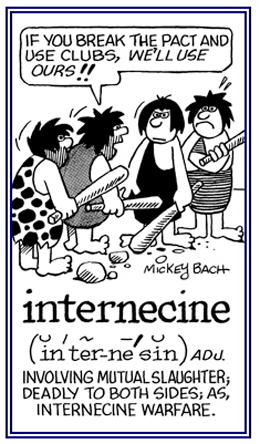inter-, intero-
(Latin: between; among, mutually, together; on the inside, internal)
Although abstracted from the many compounds in which it entered English, the form inter- was not generally considered a living prefix in English until the 1400s.
During the later period of Middle English many words borrowed in the Old and Middle French forms entre-, enter- began to be consciously respelled with Latin inter-; although vestiges of the older French borrowings are found in entertain and enterprise.
The living prefix inter- is now freely added to almost any element in English to create such formations with the meaning of "between" and "among". The words formed by intra- are closely related to this inter- prefix; in fact, they both apparently came from the same Latin source.
2. Characterized by bloodshed or carnage: In Syria, there has been a brutal internecine war going on that has harmed millions of people.
3. Concerning a dispute that can tear an organization apart: The political party has been suffering because of bitter internecine disagreements.
4. Etymology: "deadly, destructive," from Latin internecinus, "very deadly, murderous, destructive"; from internecare, "to kill or to destroy"; from inter-, "among, between" + necare, "to kill".
The original meaning of internecine is "attended by great slaughter".

Go to this Word A Day Revisited Index
so you can see more of Mickey Bach's cartoons.
Used to conduct fraudulent transactions, or to transmit the proceeds of a fraud to financial institutions, or to others connected with the scam.
2. A section or part between two nodes; such as, a nerve or stem.
2. Pertaining to or affecting structures between nuclei, as internuclear ophthalmoplegia.
3. Between the nuclear layers of the retina.
2. Between, or within, the eyes; such as, the interocular distance.
3. Situated between the eyes; such as, the antennae of some insects.
2. Between the orbits; such as, the interorbital septum (a dividing wall or partition, a general term for such a structure).
2. Uniting two groups; said of certain genera which connect family groups, or of species that connect genera.
2. To have the character of, or to lie between, two distinct groups.
3. To form a connecting link, as between objects, genera, etc.
4. Etymology: from Latin osculat-, "kissed"; from the verb osculari, from osculum, "little mouth" or "kiss".


